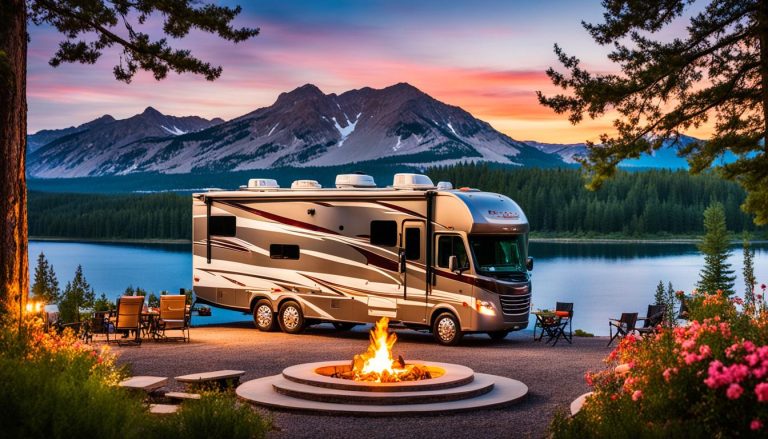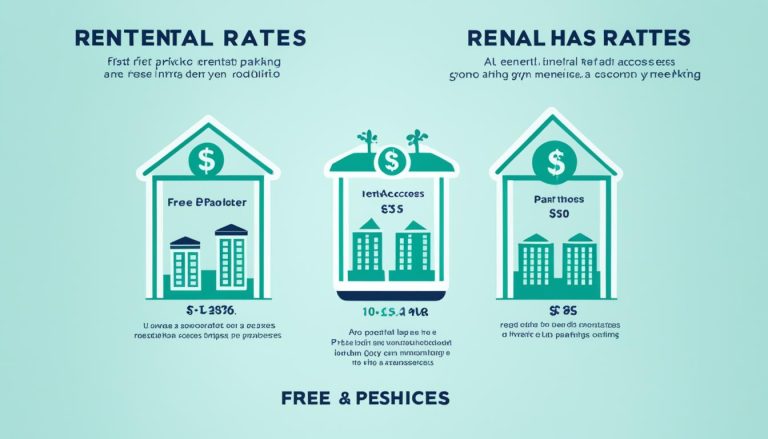Ultimate Guide: How to Rent an RV for Vacation
gorvlifestyle.com and its partners may earn a commission if you purchase a product through one of our links
Embracing the spirit of adventure has never been easier with the increasing popularity of recreational vehicles, or RVs, offering a unique and fun way to explore the vast American landscape. For many, the idea of how to rent an RV for a vacation is an enticing one, opening the door to freedom and flexibility in travel. Yet, for beginners, the RV rental process can appear overwhelming. This renting an RV guide aims to simplify the process, providing valuable RV rental tips and necessary steps to ensure a smooth journey from start to finish.
Whether it’s discovering the best model to suit a family road trip or seeking a solo escapade, renting an RV for beginners is made straightforward with detailed guidance. Through choosing a reputable rental agency, understanding insurance policies, and identifying the ideal type of RV, vacationers can navigate the rental landscape with confidence and poise.
Key Takeaways
- Becoming familiar with the various classes and types of RVs is key to a successful rental experience.
- Utilizing established rental platforms like Cruise America and RVshare can make selecting the right RV simpler and more reliable.
- Knowing the related costs, such as rental rates and insurance, is crucial to budgeting for an RV vacation.
- Attending an orientation session is important for understanding the operations and handling of the RV.
- Flighty thorough planning and research, travelers can secure their RV rental with ease and set off on their dream road trip adventure.
Understanding Recreational Vehicles: Types and Classes
Embarking on an adventure with recreational vehicles, or RVs, offers a unique blend of comfort and mobility for enthusiasts and holiday-goers alike. With the vast array of options available, understanding the different types ensures a tailored travel experience.
An Overview of Driveable RVs
Driveable RVs offer a seamless integration of transportation and living quarters, making them popular among those seeking the freedom to roam. They come in several classes, each offering distinct features and comfort levels:
- Class A Motorhomes: The epitome of luxury on wheels, Class A motorhomes provide spacious interiors, complete with all the amenities of a modern home. Their bus-like appearance underscores a robust build, suitable for long-distance travel in style.
- Class B Motorhomes: Nicknamed camper vans, these are agile and sleek. Class B motorhomes cater to those looking for simplicity and ease of driving, without forgoing the necessary conveniences of RV living.
- Class C Motorhomes: Balancing size and maneuverability, Class C motorhomes are an excellent middle ground, offering cozy living with the added stability from their truck-like chassis.
Examining the World of Towable RVs
For those who prefer to keep their living space separate from their vehicle, towable RVs present an array of choices, each catering to different needs and travel styles:
- 5th Wheel: Known for their stability and spacious design, 5th wheels require a special hitch but reward travelers with a residential feel.
- Toy Haulers: Combining living space with cargo capabilities, toy haulers are ideal for bringing along ATVs, bikes, or other large gear on your journey.
- Pop-up Campers: Highly portable and easy to store, pop-up campers are the entry-level choice for many, granting a taste of RV life without the investment of their larger counterparts.
Deciding Between Luxurious Class A, Versatile Class C, or Compact Class B
Families and individuals vary in their travel styles and needs, making the choice between RV classes a crucial aspect of trip planning:
| RV Type | Driving Ease | Space & Amenities | Best For |
|---|---|---|---|
| Class A Motorhomes | More challenging | Luxurious and spacious | Extended trips in comfort |
| Class B Motorhomes | Easiest to drive | Compact and efficient | Solo or couple adventures |
| Class C Motorhomes | Moderate ease | Balanced living space | Family or group travel |
Whether seeking the grandeur of a Class A, the simplicity of a Class B, or the versatility of a Class C, choosing the right type of RV can elevate your travel experience, combining the joy of the open road with the comforts of home.
How to Rent an RV: A Step-by-Step Process
The journey into the world of RV vacations begins with an informative RV rental guide, designed to help travelers navigate the RV rental process with confidence. This comprehensive overview breaks down the essentials on how to rent an RV, especially tailored for renting an RV for beginners. A blend of practical tips and insightful advice steers potential renters through a structured adventure from planning to the open road.
Before embarking on the RV discovery journey, it’s important to pinpoint the necessities of your planned trip. Determining the size of your travel party, assessing your budget constraints, and envisaging your ideal camping experience are all pivotal first steps. These initial considerations will guide you towards the choice between a driveable RV, offering the convenience of transportation and accommodation in one, or a towable RV, which provides the freedom to unhitch and venture in a separate vehicle.
Renters should weigh the importance of various factors, such as the ease of drivability – a critical element for those new to manning larger vehicles, fuel economy, and the range of amenities and space needed to travel comfortably. Each RV type offers unique benefits, whether it’s a Class A motorhome with ample luxuries or a compact travel trailer optimized for economic fuel consumption.
Finding the most cost-effective option involves comparing real-time rental prices, as fluctuating rental rates can significantly impact your budget. Go RV Rentals and similar platforms enable users to conduct an “apples-to-apples” comparison of camper rates by providing a detailed breakdown of costs, including seasonal variations, geographic differences, and the potential impact of rental duration. Here’s how the rates tend to change:
| RV Type | Low Season Average Per Night | High Season Average Per Night | Notable Features |
|---|---|---|---|
| Class A Motorhome | $150 | $250 | Spacious interior, luxury amenities |
| Class B Campervan | $100 | $200 | Easy drivability, efficient fuel usage |
| Class C Motorhome | $130 | $220 | Balance of space and maneuverability |
| Travel Trailer | $80 | $160 | Detachable, varying sizes available |
After delving into the rental universe and selecting an RV that fits your requirements, the next step is to engage with RV rental companies. Align your choice with your expected travel and vacation style, considering various offering services, models, and user reviews of each company. The selection then transitions into securing your RV rental, which can be conveniently done online or through a physical outlet if preferred. Online platforms often provide streamlined booking experiences, transparent pricing, and immediate confirmation of reservations.
When it’s time to pick up the keys to your adventure, an essential orientation session awaits. During this briefing, renters learn about RV operation, the nuances of vehicle handling, and the responsibilities when returning the RV. This ensures each traveler is prepared for a safe and enjoyable journey.
To wrap up the pragmatic guide to renting an RV, it’s crucial to remember these steps to make your experience smooth and enjoyable:
- Assess your travel needs and budget.
- Choose between a driveable or towable RV based on comfort and preference.
- Compare prices and options with comprehensive platforms like Go RV Rentals.
- Select a reputable RV rental company that aligns with your vacation vision.
- Secure your RV by completing the rental agreement, either online or offline.
- Attend an orientation session to learn about your RV’s features and operation.
Embarking on the RV rental journey doesn’t have to be complicated. By following a simple, tailored RV rental process, even beginners can savor the taste of freedom and adventure that comes with a home on wheels.
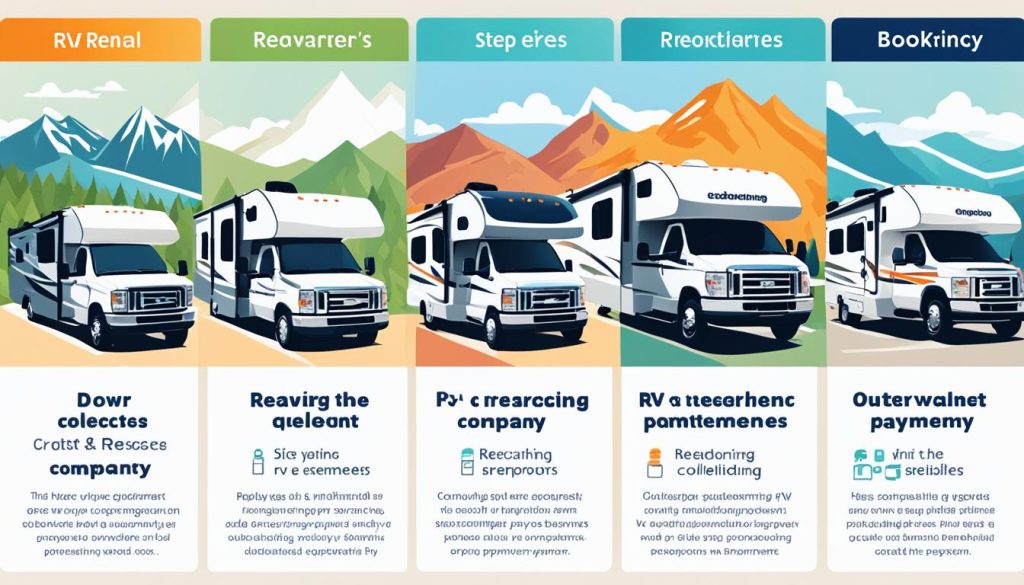
Scouting for the Best RV Rental Companies
Embarking on an RV adventure starts with finding the right rental company that fits your travel desires and comfort needs. With the market offering a wide variety of options, discerning between established agencies and innovative online platforms is key to securing the ideal home on wheels for your next escapade.
Big-Name Rental Agencies vs. Peer-to-Peer Platforms
Traditional RV rental companies like Cruise America have carved a niche in providing standardized offerings geared towards simplicity and ease of use. These agencies are known for their widespread availability and uniform fleet, making them a reliable choice for those seeking familiarity. Conversely, peer-to-peer RV rentals shake up the industry by allowing individual RV owners to rent directly to vacationers. Platforms like RVshare and Outdoorsy have broadened the horizon with their eclectic mix of RVs, tailoring to those who wish to sample different styles of RV living.
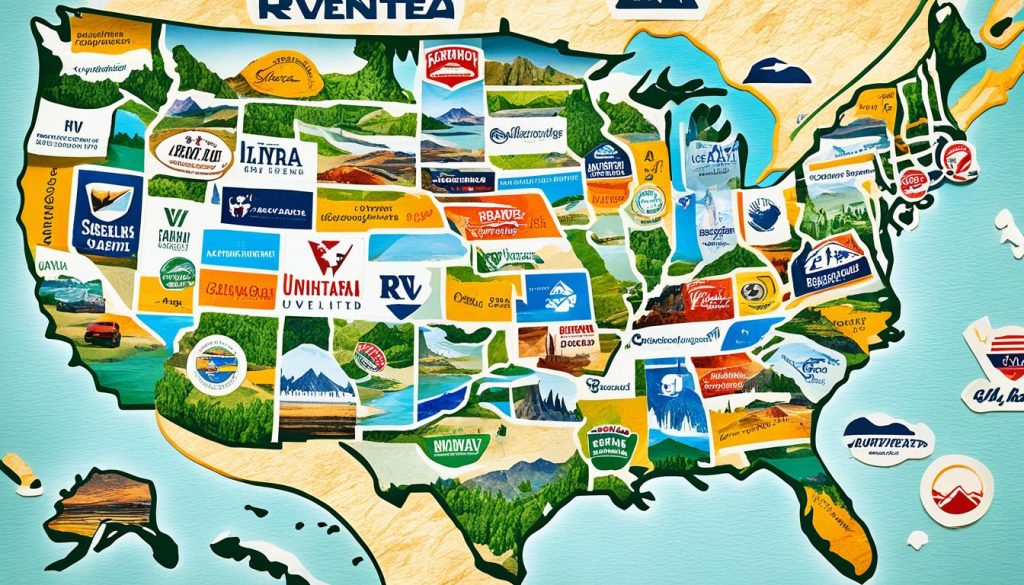
Navigating Options: RVshare, Cruise America, and Outdoorsy
As you delve into the options, comparing the services of RVshare, Cruise America, and Outdoorsy becomes a pivotal decision. Each offers specific benefits and experiences, from the professional approach of Cruise America to the personalized touch of RVshare and Outdoorsy’s peer-to-peer RV rental marketplace.
| Features | Cruise America | RVshare | Outdoorsy |
|---|---|---|---|
| Model Variety | Limited, Standardized | Extensive, Diverse | Extensive, Diverse |
| Rental Experience | Consistent | Personalized | Personalized |
| Additional Services | Basic Roadside Assistance | Roadside Assistance, Insurance Options | Roadside Assistance, Insurance Options |
| Availability | Nationwide | Wide, Dynamic Listings | Wide, Dynamic Listings |
| Rental Process | Standardized Online/In-Store | Flexible, Online with Direct Owner Interaction | Flexible, Online with Direct Owner Interaction |
What to Expect from Online RV Rental Services
Online platforms have transformed the rental process, introducing features such as detailed search filters, real-time pricing, and comprehensive customer service. As such, you’ll find a spectrum of RV choices suited to various preferences, from a cozy camper for a couple’s retreat to a spacious motorhome for a family tour. Peer-to-peer RV rentals particularly stand out for their potential to offer unique experiences and direct communication with owners, ensuring you find the right fit. When utilizing these services, anticipate a blend of convenience and novelty, with a particular emphasis on understanding the details of your rental agreement.
Always remember, whether choosing the reliability of companies like Cruise America or the variety from peer-to-peer platforms like RVshare and Outdoorsy, the open road awaits with the promise of unforgettable memories.
Cost Considerations for an RV Vacation
When planning an RV vacation, it’s vital to take into account not only the adventure that awaits but also the financial aspects that come with renting a mobile retreat. From the sleek Class A motorhomes to the cozy pop-up campers, there’s a wide range of RV rental prices to consider before hitting the road. Understanding the various costs associated with renting an RV can pave the way for a trip that’s as budget-friendly as it is exciting.
Understanding Rental Rates: From Class A to Pop-up Campers
Rental rates for RVs are as variable as the vehicles themselves. They can range significantly based on the class of the RV and the type of experience you’re looking to have. For instance, those seeking luxury on wheels might find themselves looking toward the higher end of the spectrum with Class A motorhomes, while adventurers prioritizing simplicity and convenience might opt for something like a Teardrop Camper, which tends to be more affordable.
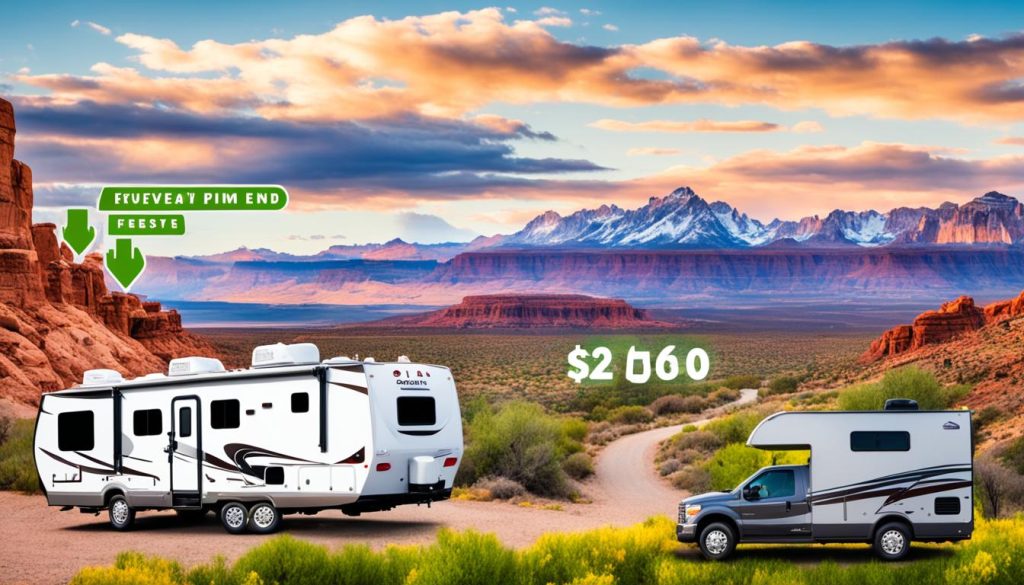
Decoding Additional Expenses: Insurance, Mileage, and Hidden Fees
Besides the base rental rate, additional expenses in RV renting are an integral part of the overall cost. RV rental insurance is a necessary consideration for protection on your journey. While some rental services include insurance in their pricing, others offer it as an added expense, with options to upgrade for more comprehensive coverage. Furthermore, mileage can also impact the final total, with some rentals including a set number of miles and others charging per mile. Lastly, renters should keep an eye out for hidden fees such as setup, cleaning, and gas refilling to ensure the budget is met without unwelcome surprises.
While costing an RV trip requires some effort, the right preparation can lead to an unforgettable vacation without breaking the bank. Through understanding the nuances of RV rental prices, insurance necessities, and potential additional expenses, travelers can embark on their RV adventure with a solid financial plan in place.
Navigating the RV Rental Process for Beginners
Embarking on an RV adventure can be an exhilarating experience, particularly for those new to this mode of travel. Venturing into the RV rental process for beginners often involves a mix of excitement and uncertainty. With practical RV rental tips and considerations for selecting an RV that matches their vacation style, neophytes can set the stage for a memorable journey.
Assessing Your Needs: Size, Features, and Accommodations
Delving into the world of RV rentals starts with an essential first step—assessing your specific needs. Future road trippers should consider not only the size of the vehicle they’ll feel comfortable maneuvering but also the features and accommodations that will contribute to their travel contentment. A spacious and amenity-packed motorhome might suit well a large family or group of friends, while a smaller, nimbler camper van could be ideal for couples or solo adventurers. It’s also essential to reflect on the type of travel experience desired, whether it’s engaging in off-grid boondocking, cozying up in a wintry mountain retreat, or soaking up the sun by the seaside.
Selecting the Right RV for Your Vacation Style
Selecting the ideal recreational vehicle is akin to finding the perfect pair of shoes—what fits and feels right will depend greatly on your vacation style. Whether you’re drawn to the #vanlife culture with its emphasis on simplicity and mobility, require the vintage charm of a refurbished camper for a picture-perfect holiday, or dream of a luxurious Airstream to coast down the highways, the choice is vast. Moreover, recognizing if you have a vehicle capable of towing, or if you’ll need the convenience of delivery services, can impact your decision between a driveable RV or a towable unit. Trustworthy rental platforms and agencies will be your go-to resource in confirming that the final selection aligns seamlessly with your envisioned RV experience.
Securing Your RV Rental Online
Embarking on an RV adventure begins with a seamless rental process. The digital age makes securing an RV rental online both efficient and user-friendly. With platforms like RVshare, the entire booking procedure—from browsing to finalizing your rental—is at your fingertips. This inclusive RV rental guide endeavors to equip you with the essential tools for a hitch-free experience, ensuring you cruise into the sunset with nothing but the open road ahead.
Comparing Real-time Prices on Rental Platforms
To get the most value for your money, comparing RV prices is a step you cannot afford to overlook. Utilize the dynamic pricing tools offered by online rental platforms to ensure that you get the best deal available at any given time. Comparison of real-time prices gives you the flexibility to adjust your travel dates and RV selection to meet your budgetary requirements.
Using Filters to Match Your Specific Requirements
An essential component of arranging your RV vacation is using search filters effectively. These digital aids empower you to customize your search to align with your specific needs. Whether you’re finetuning selections based on amenities or ensuring your RV matches the size of your travel party, the filters are designed to shepherd you towards your ideal motorhome or camper. The checklist for a successful search includes amenities, travel dates, vehicle size, budget constraints, and preferred rental terms. Finding your ideal RV has never been easier, with online platforms offering the convenience of adjusting search parameters and streamlining options that resonate with your unique excursion plans.
Trustworthy rental platforms not only assist with secure RV rental online transactions but also help initiate indelible memories on the open road. With user-friendly interfaces, comprehensive RV rental checklists, and robust support systems, these digital hubs stand ready to guide you through the selection process, rounding out your holiday preparations with confidence and ease.
Insurance Coverage for Your Rented RV
Embarking on an RV trip is exciting, but it’s crucial to think about pragmatic details like RV rental insurance. Insurance offers you protection to make sure those road trip memories are carefree and filled with joy. It’s a safety net for both you and your rented home-on-wheels.
Understanding RVshare’s Protection Plan
When you choose to rent through RVshare, you are automatically enrolled in RVshare’s Protection Plan. This comprehensive safety plan is not just a simple insurance policy; it’s designed to wrap your rental experience in a cocoon of security for you to travel the open roads without a worry.
The RVshare Protection Plan provides you with coverage reaching up to a significant $300,000 for comprehensive and collision insurance in the event of an accident or damage. Availability across all 50 states and Canada makes it a universal choice for travelers. Enhanced with a suite of additional benefits like round-the-clock roadside assistance and tire service, you can be assured of support whenever you might need it.
Comparing Insurance Packages Between Rental Companies
Exploring RV insurance options can be akin to navigating a labyrinth. Each rental company drafts its own set of policies and protections, which can make side-by-side comparisons rather complex. A vital step in choosing the appropriate coverage for your rental is to understand what is on offer and how it measures against what you might need on your travels.
| Company | Base Coverage | Roadside Assistance | Policy Transparency | Optional Add-Ons |
|---|---|---|---|---|
| RVshare | Up to $300,000 | 24/7 included | Clear and separate itemization | Upgradeable at booking |
| Other Rental Companies | Varies | Often included | May require additional fees | Varies according to package |
When synthesizing the data, note the differences in protection plans. RVshare stands out with its substantial base coverage and the ease of understanding its insurance pricing. Policies are stated clearly, devoid of hidden charges that could spring up and inflate your travel budget. Renters are also afforded the flexibility to opt for upgraded coverage, a boon for those seeking added peace of mind.
Understanding the differences between the insurance options offered by big-name rental agencies and peer-to-peer platforms ensures that renters choose the best coverage for their specific RV and travel needs.
Getting to Grips with the RV: Orientation and Operation
Embarking on an RV adventure begins with a proper introduction to your rented mobile abode. The moment you step into the world of RV travel, a comprehensive orientation is not just a handy tool; it’s a necessity for a safe and comfortable journey. Mastering RV operation includes everything from learning the control panels to understanding the maintenance essentials. Before hitting the open road, renter’s preparation through a detailed RV orientation sets the stage for a memorable and hassle-free road trip.
What to Expect During the Pick-up and Demo
Setting the wheels of your vacation in motion starts with the pick-up of your RV. Here, an in-depth demo awaits as the owner or rental company guides you through the RV’s intricacies. At this juncture, you’ll dive into the RV rental checklist, ensuring you’re equipped with the knowledge to manage the vehicle’s facilities. Expect to leave the lot with a clear understanding of RV operation, from slides to awnings, water systems to electrical components, helping to steer clear of potential roadblocks during your travels.
Responsibilities When Returning the RV
As the sun sets on your RV escapade, returning the vehicle in top condition becomes a pivotal responsibility. Adhering to an RV rental checklist can safeguard against unforeseen charges post-trip. RVshare and other rental platforms lay out specific conditions for waste tanks to be emptied, fuel to be replenished, and the living space to be tidied. Make sure to perform these tasks with diligence, honoring the agreement and maintaining the RV’s integrity. Being thorough in your RV operation while on the road and attentive when wrapping up your lease can seal your rental experience with excellence.

